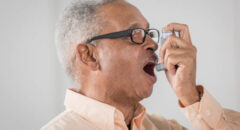 In 2011, 12.7 million Americans were estimated to have chronic obstructive pulmonary disease (COPD). What’s even more alarming is the fact that another 12 million people don’t know they have COPD, according to the National Heart, Lung and Disease Institute. Could you be one of them? With that many undiagnosed people out there, it’s very possible. See your doctor if you experience any of the following symptoms:
In 2011, 12.7 million Americans were estimated to have chronic obstructive pulmonary disease (COPD). What’s even more alarming is the fact that another 12 million people don’t know they have COPD, according to the National Heart, Lung and Disease Institute. Could you be one of them? With that many undiagnosed people out there, it’s very possible. See your doctor if you experience any of the following symptoms:
- Shortness of breath, especially when participating in any physical activities
- Excessive coughing
- Difficulty taking deep breaths
- Feeling of tightness in your chest
- Lack of energy
- Blueness of the lips and fingernails
- Frequent respiratory infections
- Sputum (mucus-like fluid from lungs) production during coughing sessions
MUST READ: 10 Reasons Why Black Men Need To Talk About COPD More
As the disease progresses, the symptoms may worsen, which is known as acute exacerbation of COPD. The symptoms of COPD suddenly worsen and usually last for several days. In short, it’s a flare up.
Symptoms of acute exacerbation of COPD include coughing and wheezing more than usual, an increase in the amount of mucus and/or a change in the color, fever, fatigue and swelling in your feet and/or ankles.
How is COPD diagnosed?
COPD is diagnosed using a simple breathing test called spirometry.
How is COPD treated?
If you have COPD, the most important steps you can take to reduce symptoms and improve your quality of life are:
1. For people who smoke, the most important part of treatment is to stop smoking.
2. Avoid tobacco smoke and other air pollutants at home and at work.
Your doctor may also consider the following treatment options:
- Medicine. Symptoms such as coughing or wheezing can be treated with specific types of medicine. Current COPD treatments include







